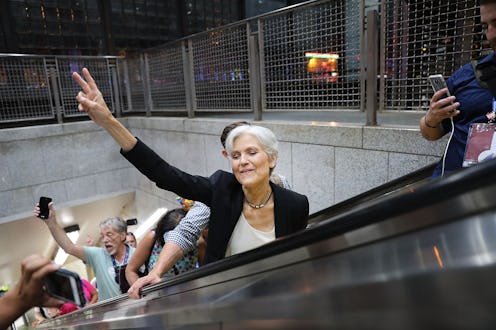News
Jill Stein Speaks Out — And It's Not Reassuring
Throughout the Democratic National Convention, there was one woman running for America's highest office who wasn't inside the Wells Fargo Center, but rather, was out around the streets of Philadelphia trying to rally support. I'm talking about Green Party presidential candidate Dr. Jill Stein, who's been trying to court disaffected supporters of Vermont Senator Bernie Sanders over the past couple of months, seemingly to some success. But her determined, no-chance-to-win-but-could-maybe-play-spoiler candidacy has her saying some pretty inflammatory things, as well ― for instance, Jill Stein invoked Nazi Germany to attack Hillary Clinton earlier this week.
If that sounds a little bit "wait, what!?" to you, rest assured you're not alone. Here's what Stein said, when asked by WGBH's Adam Reilly how she'd feel if her effective role in the race was to help elect Donald Trump. Unsurprisingly, Stein didn't back down on her strident opposition to Clinton, but she went even further ― she seemed to suggest that Trump was preferable to Clinton, and that it was "neoliberalism" that would lead to "neofascism":
What we know from history and what we know from the current situation is that we are seeing a rise in right-wing extremism, not just in the United States and it's not just Donald Trump, it's also throughout countries in Europe. What is driving this? It is policies like NAFTA, like globalization, like the dominance of the banks, like the Wall Street bailouts, like the Wall Street meltdown thanks to deregulation. Who gave us those policies? The Clintons were leading the way on those policies ― the answer to neofascism is to defeat neoliberalism.
Stein's line of reasoning, regardless of whether you agree with it, seems to be this: Neoliberal policies like NAFTA and globalization hurt and put strain on American workers, which breeds resentment and right-wing discord, which furthers the emergence of neofascism. Of course, this is an awkward message to be making in defense of Trump, and against Clinton, given that Trump has campaigned in a more apparently fascistic manner than any presidential candidate in modern memory. She wasn't finished there, though ― she then proceeded to equate the effects of a Clinton election to the rise of the Third Reich.
Putting another Clinton in the White House will fan the flames of this right-wing extremism. We have known that for a long time, ever since Nazi Germany.
Obviously, it's hard to say whether Stein really believes that a Clinton presidency would usher in a new era of American fascism, or whether she's just hammering this point to pick up a spare few votes here or there. It's also true that she's not the only person to break Godwin's Law over the past few decades ― comparisons between George W. Bush and Hitler were distressingly common among liberals and Democrats throughout his presidency, often parallel with belief in 9/11 conspiracy theories, and the American right (not far enough right for it to be meant as a compliment, obviously) have been calling Obama Hitler for years, too.
But the tension in what Stein is saying, beyond just how wildly inflammatory and offensive it is, is pretty plain ― there's only one candidate in this race who's demeanor, expressed and implied political philosophies, and attitude toward dissent evokes European-style fascism, and it is not Hillary Clinton. This is a belief shared by concerned political observers on the left and the right alike, and the stakes of electing someone with such terrifying potential are obvious ― when you open that box, you can't be sure what's going to come out.
Also, Stein's answer casts Trump's rise as foremost driven by failures in economic policy, leaving virulent racism and xenophobia out of the equation. Basically, she's arguing that since neoliberal policies have aided the rise of fascists like Trump, let's go ahead and elect the fascist outright. Or, at the very least, let's not worry about him winning, if that's what it takes for her to finish at 5 percent instead of 4.
This isn't the only controversy the Green Party nominee has waded into recently, either ― she's also drawn criticism over her recent remarks on vaccination, which while deferential to their importance and value, also indulged some all-too-common "questions" among the anti-vaccination left. Here's what she said, as detailed by Dave Wiegel of the Washington Post:
There were concerns among physicians about what the vaccination schedule meant, the toxic substances like mercury which used to be rampant in vaccines. There were real questions that needed to be addressed. I think some of them at least have been addressed. I don’t know if all of them have been addressed.
It's probably not strictly fair to call Stein anti-vaccination, to be clear ― she does speak in support of their benefits. The specific "questions" that the anti-vaccination movement has been fixated on for the last couple of decades, specifically claims of a link between vaccines and autism, have been exhaustively studied and debunked. As such, Stein seemingly playing nice with this kind of rhetoric is startling all the same, and should be a concern for public health advocates ― as the furthest-left American political party with a widely known name, anti-vaccination activists figure to be firmly with the Greens' wheelhouse.
